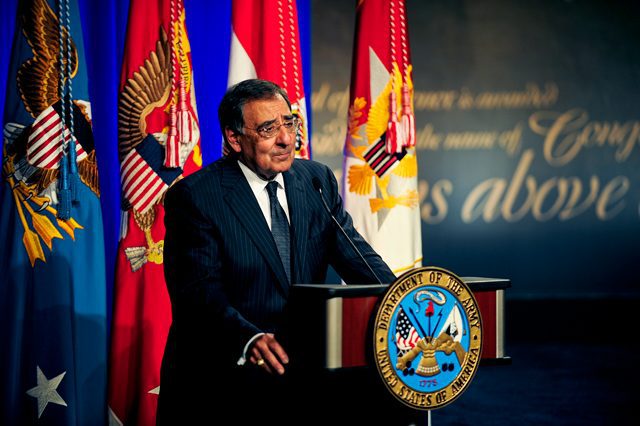Iranian Ship Linked to Houthi Attacks Heads Home Amid Tensions
(Bloomberg) — An Iranian ship that’s been linked to Houthi attacks in the Red Sea is returning home, removing a prominent asset in the area as the Islamic Republic braces...


U.S. Defense Secretary Leon Panetta assured anxious Asian allies on Sunday that the U.S. will maintain its large military presence in the Pacific as a counterweight to China, despite mounting pressure at home to cut spending.
China’s military buildup and aggressive posture in the South China Sea has become a growing U.S. concern, officials say.
But in his first trip to Asia as Pentagon chief, Mr. Panetta appeared to tone down his rhetoric, praising Beijing’s muted response to a recent U.S. arms deal with Taiwan and voicing confidence that a closer bilateral relationship can be forged despite deep mistrust on both sides.
Mr. Panetta’s promise to “strengthen our presence in this part of the world” was part of what officials described as a “realignment” of U.S. interests.
As American forces withdraw from Iraq this year and Afghanistan by the end of 2014, the U.S. will be able to expand its diplomatic and military influence deeper into Southeast Asia and the Pacific, officials said.
Mr. Panetta said his goal in visiting Asia was to dispel fears among U.S. allies that defense-spending cuts as part of deficit-reduction efforts will force Washington to curtail its role in the region.
“I know you have probably all been following the budget debate in the United States with keen interest and are questioning whether we will follow through on these commitments. Let me assure you that we will not be reducing our presence in Asia,” Mr. Panetta told defense ministers from the 10-member Association of Southeast Asian Nations, or Asean, on the Indonesian resort island of Bali.
Mr. Panetta told the ministers that the Pentagon envisages expanding the U.S. military’s presence in Southeast Asia and into the Indian Ocean. He said this would include closer cooperation with Australia and the deployment of a littoral combat ship to Singapore.
“The purpose of my visit is to make it very clear to this region and to our allies in the Pacific that…the Pacific will remain a key priority for the United States, that we will maintain our force projection in this area, that we will maintain a presence in this area, that we will remain a Pacific power,” Mr. Panetta told reporters.
Since becoming Pentagon chief in July, Mr. Panetta has yet to meet directly with his Chinese counterparts, but he said Sunday that he felt “pretty confident” that the two “major” Pacific powers—China and the U.S.—can build on what until now has been an on-again, off-again military-to-military relationship.
Mr. Panetta urged Beijing to be more “transparent” about the advanced weapons it is developing. China is building stealth-fighter aircraft, but Washington is more concerned about antiship missiles that could threaten the U.S. fleet in the Pacific and beyond.
He singled out for praise China’s reaction to Washington’s decision to sell Taiwan military-fighter upgrades rather than new planes. After the announcement, China said relations with the U.S. would suffer. But Mr. Panetta said he knew of no moves by Beijing to curtail relations in response to the sale.
“I guess I would commend them for the way they handled the news of that sale to Taiwan,” he said. “I think we had given the Chinese, you know, a heads-up as to what was going to take place, and I think in the end they handled it in a professional and diplomatic way. We appreciate that.”
Tensions have been high in the South China Sea, where China has conflicting territorial claims with Vietnam, the Philippines, Taiwan, Malaysia and Brunei.
Reflecting the sensitivities in the region, Asian defense ministers meeting Sunday discussed the disputes but didn’t mention China by name, a senior U.S. defense official said. China isn’t a member of Asean.
Mr. Panetta said the U.S. would continue to push for “free and open commerce” and “open access” to the South China Sea and other waterways.
“There is no question there are concerns,” Mr. Panetta said of Beijing’s posture in the South China Sea. “But the best place to be able to express those concerns is to be able to do that in an open and free discussion with the Chinese.”
China restored military-to-military relations with the U.S. this year, and Mr. Panetta said he hoped to expand contacts further.
Mr. Panetta’s tone on China was notably restrained.
During a recent trip to Europe, Mr. Panetta said: “The most important thing we can do is to project our force into the Pacific. To have our carriers there, to have our fleet there, to be able to make very clear to China that we are going to protect international rights to be able to move across the oceans freely.”
Mr. Panetta plans trips to Japan and South Korea later this week.
By Adam Entous, Copyright 2011 Dow Jones
Join the gCaptain Club for curated content, insider opinions, and vibrant community discussions.


Join the 105,983 members that receive our newsletter.
Have a news tip? Let us know.
Access exclusive insights, engage in vibrant discussions, and gain perspectives from our CEO.
Sign Up




Maritime and offshore news trusted by our 105,983 members delivered daily straight to your inbox.



Essential news coupled with the finest maritime content sourced from across the globe.
Sign Up